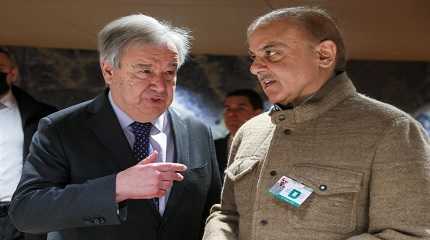
GENEVA, Jan 9 (Reuters) - Pakistan said on Monday that donors had committed to give more than $8 billion to help it recover from last year's devastating floods in what is seen as a major test for who pays for climate disasters.
Officials from some 40 countries as well as private donors and international financial institutions are gathering for a meeting in Geneva as Islamabad seeks help covering around half of a total recovery bill of $16.3 billion.
Waters are still receding from the floods caused by monsoon rains and melting glaciers which killed at least 1,700 people and displaced around 8 million.
Pakistan Information Minister Marriyum Aurangzeb sent a tweet saying that pledges had reached $8.57 billion - more than it had initially sought.
Among the donors were the Islamic Development Bank ($4.2 bln), the World Bank ($2 bln), the Asian Development Bank ($1.5 bln) as well as the European Union and China, she said. France and the United States also made contributions.
Earlier, United Nations Secretary General Antonio Guterres called for massive investments to help Pakistan recover from what he called a "climate disaster of monumental scale".
"Pakistan is doubly victimized by climate chaos and a morally bankrupt global financial system," he added. He later elaborated saying the current system was "biased" towards the rich countries who conceived it.
Additional funding is crucial to Pakistan amid growing concerns about its ability to pay for imports such as energy and food and to meet sovereign debt obligations abroad.
Pakistan's finance minister is meeting an International Monetary Fund delegation on the sidelines of the Geneva meeting.
Prime Minister Shehbaz Sharif said the country was committed to the IMF programme but that he was asking the IMF for "breathing space" to meet its commitments, without elaborating.
In comments to the conference earlier on Monday, Sharif said Islamabad was willing to provide around half of the $16.3 billion bill but wanted donors to contribute the rest.
"I am asking for a new lifeline for people who need to power our economy and re-enter the 21st century with a future that is protected from such extreme risks to human security," he said.
Millions of homes, tens of thousands of schools as well as thousands of kilometres of roads and railways still need to be rebuilt, the U.N. says.
Efforts to secure funding for the initial emergency phase of the disaster response were disappointing with a humanitarian aid package of $816 million less than half funded, U.N. data showed.
United Nations' Development Programme Administrator Achim Steiner said the next phase of the Pakistan response represented a "monumental moment of reckoning for the entire world".




